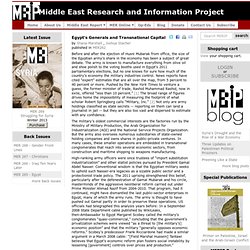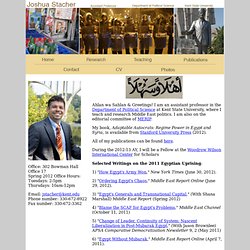

Brownlee.stacher.2011..APSA-CD%20copy. Egypt's Generals and Transnational Capital. Before and after the ejection of Husni Mubarak from office, the size of the Egyptian army’s share in the economy has been a subject of great debate.

The army is known to manufacture everything from olive oil and shoe polish to the voting booths used in Egypt’s 2011 parliamentary elections, but no one knows for sure how much of the country’s economy the military industries control. News reports have cited “expert” estimates that are all over the map, from 5 percent to 40 percent or more. Pushed by the New York Times to venture a guess, the former minister of trade, Rashid Muhammad Rashid, now in exile, offered “less than 10 percent.” [1] The broad range of figures drives home the impossibility of measuring the footprint of what scholar Robert Springborg calls “Military, Inc.” [2] Not only are army holdings classified as state secrets -- reporting on them can land a journalist in jail -- but they are also too vast and dispersed to estimate with any confidence.
Blame the SCAF for Egypt's Problems - By Joshua Stacher. On Sunday evening, Egyptian plainclothes police and the army attacked a protest by peaceful demonstrators.

Dozens were killed and hundreds wounded, while state television spread inflammatory news of Copts attacking soldiers. Many immediately concluded that sectarianism was to blame, rather than the military command which oversaw the bloodbath. The ability of Egypt's Supreme Council for the Armed Forces (SCAF) to avoid accountability for its actions lies at the heart of the problems in today's Egypt.
This myth about Egypt's transition runs deep. It blames the stagnation of the country's transition on the divided protest movement, unsatisfied public sector workers, factory labors, and rural farmers. The consensus view of the SCAF seems to be that the Council is comprised of honorable men who haphazardly rule, clumsily respond, and do not lust for power. Blame for the sorry state of the Egyptian transition should not be shared. Tech. Joshua Stacher.
Ahlan wa Sahlan & Greetings!

I am an assistant professor in the Department of Political Science at Kent State University, where I teach and research Middle East politics. I am also on the editorial committee of MERIP. My book, Adaptable Autocrats: Regime Power in Egypt and Syria, is available from Stanford University Press (2012). All of my publications can be found here. During the 2012-13 AY, I will be a Fellow at the Woodrow Wilson International Center for Scholars Selected Writings on the 2011 Egyptian Uprising: 1) "How Egypt's Army Won," New York Times (June 30, 2012). 2) "Ordering Egypt's Chaos," Middle East Report Online (June 29, 2012). 3) "Egypt's Generals and Transnational Capital," (With Shana Marshall) Middle East Report (Spring 2012)
Stacher and Brownlee on Democracy Prevention. Adaptable Autocrats: Regime Power in Egypt and Syria - Joshua Stacher. Book excerpt: Josh Stacher's "Adaptable Autocrats" One-time contributor to the blog Joshua Stacher recently published his book, Adaptable Autocrats: Regime Power in Egypt and Syria.

Since the 2011 uprisings, there has been a debate in Middle Eastern academia as to whether regional specialists focused too much on the persistence of authoritarianism (and power elites in particular) and not enough on the societies (and social movements in particular.) Of course, the two are not mutually exclusive, and the debate has had its ups and down according to what’s in the news. In this book, Josh looks the regime structures as an indication of both regime sustainability and adaptability, and applies this research to how Egypt and Syria handled the uprisings and their aftermath. Josh writes: Rather than explain the transition, this book compares how the structure of executive power allows for an authoritarian regime to change its ruling coalition (or not). From the abstract: And is an excerpt from the introduction of Adaptable Autocrats: